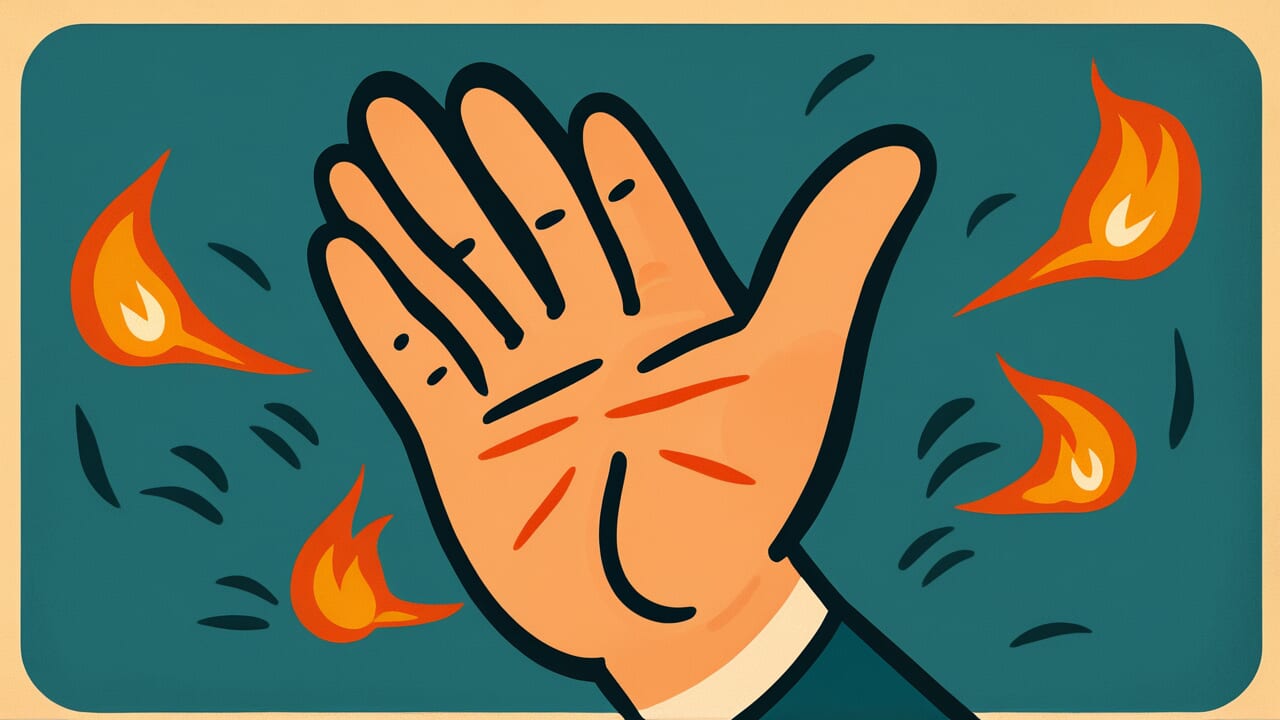How to Read “The fire god’s burn”
Kōjin no yakedo
Meaning of “The fire god’s burn”
“The fire god’s burn” is a proverb that warns us about treating important things carelessly. If you handle something precious with disrespect, disaster will come back to you.
It teaches that careless treatment brings painful consequences.
This proverb is used as a warning for people who are about to treat something lightly or carelessly.
It applies when someone handles tools roughly, neglects relationships, or tries to finish work half-heartedly.
When we’re about to treat something that deserves care with carelessness, this saying reminds us to stop.
This lesson remains important today. We often chase efficiency and speed, losing sight of what truly matters.
This proverb reminds us that care and respect are essential.
In the end, cutting corners and careless behavior come back to hurt us.
Origin and Etymology
Clear historical records about this proverb’s origin are limited. However, the words themselves reveal an interesting background.
“Kōjin” refers to the fire god and kitchen god in Japanese folk religion.
This deity was especially cherished in homes. People worshipped it carefully as the god who governed daily meals.
This god was believed to have a fierce nature. People feared that treating it carelessly would bring curses.
The kitchen is a space where fire is handled. Fire is essential to human life, but one mistake can burn down a house or take lives.
That’s why reverence for Kōjin, the fire god, was particularly strong.
The word “burn” in this proverb represents the danger of fire.
Treating Kōjin carelessly means handling fire carelessly. This leads to getting burned, a painful consequence.
This wasn’t just about physical danger. It also meant punishment for disrespecting the god.
This lesson about treating important things carefully has been passed down through generations.
The concrete image of the fire god and burns made the teaching memorable.
Interesting Facts
Kōjin is also called “Sanpō Kōjin.” This belief uniquely blends Buddhism and Shinto.
It’s often enshrined in kitchens as a guardian against fire and for household safety.
Many homes and restaurants still cherish this deity today. Kōjin worship remains especially strong in the Kansai region.
Burns are particularly memorable among painful injuries. Once you get burned, the pain and scars last a long time.
This creates a strong impression: “I’ll never make that mistake again.”
This proverb uses the specific pain of burns to engrave the lesson more vividly in our hearts.
Usage Examples
- I handled an important client carelessly, and it became the fire god’s burn when we suffered a huge loss
- Neglecting tool maintenance leads to the fire god’s burn, so I do proper maintenance every day
Universal Wisdom
“The fire god’s burn” teaches us a fundamental law of human society.
Everything deserves appropriate treatment. Ignore this, and you’ll always pay a price.
Why do people treat important things carelessly? It comes from familiarity, overconfidence, or choosing immediate ease.
Tools we use daily, people always beside us, environments we take for granted.
We often realize their value only after losing them.
This proverb has been passed down because humans fundamentally “lose sight of what they have.”
Our ancestors deeply understood this human weakness. That’s why they used the painful image of burns to warn us strongly.
What’s interesting is that this proverb shows actual cause and effect, not just moral preaching.
Treat things carelessly and they break. Handle things sloppily and you fail.
This isn’t divine punishment. It’s natural law.
In relationships, work, and handling objects, treating things with care and respect matters.
When we forget this, we inevitably suffer. Our ancestors conveyed this universal truth in simple words.
When AI Hears This
When the human brain learns danger, it remembers a wider range as “dangerous” than the actual cause.
This proverb describes someone burned by fire who then fears even Kōjin, the hearth god who doesn’t use fire.
Psychology calls this phenomenon “stimulus generalization.”
Interestingly, this excessive fear response has evolutionary logic. Our ancestors on the savanna who avoided “all large brown animals” after one lion attack had better survival rates.
Even if they avoided harmless animals, that was better than missing a threat.
In statistics terms, “false positives” (wrongly judging danger) are acceptable, but “false negatives” (missing danger) are fatal.
However, this instinct backfires in modern society. Someone who gets sick from one food additive rejects other additives proven scientifically safe.
People see airplane accident news and avoid planes, though statistically much safer than cars.
These reactions use the same psychological mechanism as “the fire god’s burn.”
The brain treats “seemingly related things” as dangerous together, reducing thinking costs.
Our excessive risk avoidance is a cognitive shortcut for saving energy.
Lessons for Today
This proverb teaches modern people that small acts of daily care protect your future self.
In today’s society that values speed and efficiency, temptations to cut corners are everywhere.
Replying to emails carelessly, postponing tool maintenance, taking promises lightly.
These small acts of “carelessness” eventually return as major pain.
But this isn’t something to fear. It’s actually a message of hope.
Because it also means careful treatment brings good results back to you.
Look at what surrounds you, the people you meet, the work you’re given.
Try treating each with respect. Handle tools carefully, listen seriously to people, approach work honestly.
These accumulated actions protect you and build a rich life.
Recognizing the value of care before feeling the pain of burns.
That’s the gentle yet powerful wisdom this proverb gives us living in modern times.



Comments